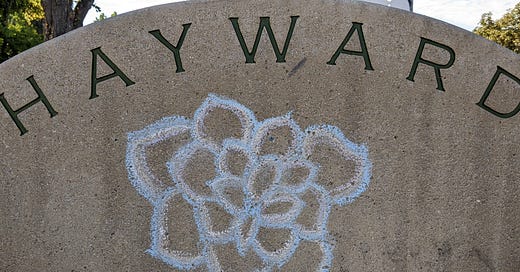Council Splits Over Marquee Events
In Which: The City increases fees to cover costs. Voter Suppression advocates give public comment. And Special Events page will make it easier to host events in the City.
Voter Suppression Advocates Line Up
Six white people from unnamed places in Alameda County talked to City Council about voting. They claimed to be members of United Sovereign Americans, a voter-suppression outfit that has filed multiple lawsuits in states across the country. Despite their early warning that they definitely aren’t trying to overturn the 2022 election, the group seems to be actively advocating for voter suppression efforts in the lead-up to the 2024 election.
One member said, “The 2022 election appears to have been invalid” citing unnamed groups doing unspecified analyses, which they assured the public was very thorough and professional. However, over their three-part reading of a resolution they wanted City Council to adopt, the first thing mentioned was enacting voter ID law. Given Hayward’s Sanctuary City status and incredibly diverse population, it would be shocking if City Council gave any thought to supporting the resolution.
Taking Homelessness Out Of Committee
Councilmember Roche said she was concerned that homelessness was being removed from the newly formed Housing Policy and Resource Committee (HPRC). City Staff explained that the reason was because of the Homelessness State of Emergency that Council had previously enacted, which forces all homelessness items directly to the full Council.
Mayor Salinas took a moment to talk up the City’s accomplishments on the subject of homelessness. “The City of Hayward has made significant strides in both producing housing and affordable housing and also in the area of responding to our unhoused population,” he said. “Those who have been observing us over the last two or three years have clearly seen our incredible investment.”
While the 2022 Point In Time (PIT) Count did see the count of unhoused Hayward residents decrease by 22%, the 2024 PIT Count saw an increase of 30%. Fortunately, the number of those in a shelter increased over 100% over the 2022 count. Councilmember Syrop said that the scope of the committee can always be changed later, if needed, since it is now a standing committee.
Fees Set To Increase Almost Everywhere
The City of Hayward took a look at every fee it charges across the entire City and adjusted rates. A consultant presented a new fee structure to City Council that included dozens of fee increases, big and small, as well as a few minor fee decreases. These increases will generate about $1,600,000 per year in additional revenue for the City.
The consultant explained the difference between a fee and a tax. A fee is only for cost-recovery purposes and can only be applied to services that individuals benefit from. For example, the permit fee for replacing a driveway only benefits that homeowner and not the entire city. The consultant also developed a model that will allow the City to adjust its fee structure annually, instead of having to do a full reevaluation every several years.
One of the new fees that was recommended was adding a credit card transaction fee of 4%. According to Staff, the cost of credit card fees has tripled for the City over the last few years due to a dramatic increase in the number of credit card transactions. The 4% fee would only apply to transactions of $300 or more, which would exempt most residential utility bills.
Comparisons and Fiscal Responsibility
Perhaps because of Councilmember Bonilla’s demand for a balanced budget, many Councilmembers openly celebrated the fee increases. “I think it’s fiscally responsible for us to sort of keep up with the fee increases,” Councilmember Roche said. Councilmember Syrop agreed. “I think this is a great way to demonstrate what it looks like for us to be smart with our revenue,” he said, “especially in the face of some of the questions around the budget.”
However, he wanted to make sure that the increases don’t discourage development going forward—a sentiment shared by Councilmember Zermeño. But Staff said that they had compared Hayward with other local cities (San Leandro, Fremont, Union City, Berkeley, San Mateo, and Milpitas) and found that the new structure was average in most areas.
Despite this, Councilmember Andrews asked if there were fee-free options for payment, and Staff said that there were. “It is wise for us to be considering our income,” Councilmember Goldstein said, “but we also want to be compassionate with our residents.” Mayor Salinas wondered if there was a way to promote the fee-free options—Councilmember Andrews suggested inserts in water bills—but overall felt that the fees were fair. “We’re still right where we need to be,” he said.
New Event Process Coming Soon
The City put together a new process for hosting events. The new Special Events page was unveiled about a month ago. It not only walks new hosts through the process, but also gives them a way to get funding from the City.
There are 4 different tiers for funding, depending on the nature of the event, with different amounts and application deadlines. While the applications will be received on a “first come, first served” basis all year long, the City needs advanced notice in order to close streets, process permits, and other things. Any grantees will also have the Special Event Permit fee waived—a nearly $3,000 value.
The City also has three Marquee Events (The MLK Jr. Birthday Celebration, Light Up The Season, and the Hearts of Hayward) that receive substantial programming and planning support from the City, costing a lot in staff time. The City only has capacity to run 4 Marquee events, so they wanted to know what event should be the 4th.
They also showed this slide that lists the events that the City funded, who hosted it, and how many people were predicted to show up.
Council Divided Over Marquee Events
Unsurprisingly, Councilmembers Andrews and Zermeño each wanted their event to be a Marquee Event. Councilmember Andrews advocated for the Juneteenth event. “I would encourage the City to take ownership of that as much as possible,” she said. Councilmember Zermeño, however, advocated for the Cinco de Mayo event. “I think it’s time that we graduated to a Marquee event,” he said, “I think it’s time that we do this.”
Councilmember Roche, and the rest of Council, found themselves in the uncomfortable position of having to choose sides between two different cultural events. Mayor Salinas felt similarly. “I don’t want to sit here and go ‘Well, I prefer Cinco de Mayo to be a Marquee and Kwanzaa? No,’” he said, “I don’t want to get into that conversation.”
Unfortunately, the discussion seemed to have hinged on the perceived shine of the Marquee Event designation over what it actually means. “Let’s prioritize these events that clearly have demonstrated attendance, capability of drawing sponsorships—revenue, and that staff is used to,” the Mayor said, which did not align with Staff explanations.
The Marquee Events need “programming and planning support vs. providing City resources,” according to Assistant City Manager Youngblood. The Cinco de Mayo Festival, for example, has been going on for decades and has a robust planning committee. It wouldn’t make sense for the City to come in and take over just to make it Marquee Event.
Councilmember Roche finally suggested that the winning move was not to play. “[Let’s try] going with the three we’ve inherited [MLK Birthday, Light Up The Season, and Hearts of Hayward] and seeing how the rest play out,” she said. “Everyone has different interests with what their favorite events are at this point.” Councilmember Zermeño agreed, “Let’s not rush to designate something as a Marquee event just yet.”
But The Process! What About That?
Councilmember Andrews asked why Events funding was moved out from under the Community Services Commission (CSC), which had handled it in the past. Staff said that the application process was overly difficult—and it very much was—and also needed to be submitted so far in advance that it was hard for small organizers to cope. However, Staff didn’t present the guidelines that the CSC had created to guide funding, which may have helped the discussion.
Councilmember Zermeño wanted to give priority to organizers in Hayward and Councilmember Syrop agreed. “We should definitely prioritize groups that are coming from Hayward,” he said. “These are Hayward events.” Councilmember Zermeño then asked Staff to clarify which events have to use Hayward branding on their promotion. Staff said only Marquee events would need to use it, not regular grantees.
Councilmember Roche asked how the Events funding works with the People’s Budget Projects—many of which were also events. Acting City Manager Claussen said it would be a separate process. “Having been through [The People’s Budget] once, I think we learned some lessons and think that we can set some expectations with the community partners that we end up engaging with,” he said. “If we do The People’s Budget again.”
Councilmember Syrop pushed for a Spanish Language option for the events application, as well as a way to save a draft or have a print version for those who may need it. He challenged having events funded on a “first come, first served” basis. “I think it would be better if there were maybe 2 tranches [of funding], like a winter and a summer tranche,” he said. He also didn’t like the attendance requirements. “500 [people] for Tier 1 means we’re spending $20 per person, which seems low to me,” he said.
Councilmember Syrop also suggested separating funding for Marquee and Special events so they don’t have to compete with each other. Councilmember Goldstein agreed. “We’re gonna do these [Marquee] events, right?” he said, “It’s not even a question.” They suggested that, since they’re being funded regardless, they should have dedicated funds.
Some on Council also wanted to have events from a variety of organizations from around the City. “[We should be] making sure different organizations are represented,” Councilmember Goldstein said. Councilmember Syrop encouraged more events in West and South Hayward, which rarely see big events. Mayor Salinas agreed. “I know as we roll this out,” he said, “it will bring a lot more equity to all the organizations that are applying for money.”
The Events Funding project will come to Council one more time for final approval after taking into account the feedback. Regardless of the particulars, having a more accessible way to host events will only be a good thing. “Just having a point of contact or just the few people you know are working on that event will save so much time,” Councilmember Andrews said.








